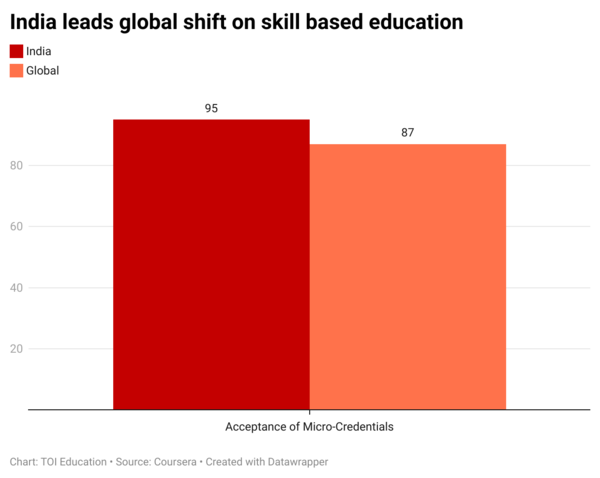
The world is witnessing a major shift – from traditional education methods to skill-based learning, with India leading the way. According to Coursera micro-credentials 2024 Impact Report95% of Indian higher education leaders, including deans, provosts, presidents, professors, and other university educators believe microcredentials can enhance student capabilities Employment opportunities. This is significantly higher than the global average of 87%, showing that India is actively embracing skills-based education to meet the needs of the modern workforce.

Indian institutions are not only adopting micro-credentials at an impressive pace but also integrating them into their academic frameworks. Currently, 52% of Indian higher education institutions (HEIs) offer academic credit micro-credentials, and almost all institutions (94%) plan to do so within the next five years.
This development is driven by the National Credit Framework (NCrF), which is based on national education policy (NEP), which allows students to earn transferable credit for traditional academic achievement and skills-based learning.
Micro-credentials: Bridging the gap between education and employment
Microcredentials have become a critical tool in preparing students for the workforce, providing them with the skills that today’s employers prioritize. An overwhelming 95% of Indian higher education leaders believe that students with microcredentials are more employable than those without microcredentials. This confidence surpasses global consensus, with 87% of higher education leaders expressing similar sentiments.
Students in India also recognize the value of micro-credentials. A staggering 96% of people believe that earning Professional certificate It will give them an advantage with employers and improve their chances of finding a job after graduation. Notably, the most popular certificates align with in-demand roles such as project management and data analysis, reflecting the alignment of academic programs with market demand.
Employers are increasingly attracted to candidates with microcredentials, viewing them as evidence of job-specific skills. Coursera reports that recruiting teams are 85% more likely to select candidates with professional credentials because these credentials help validate the applicant’s abilities. This trend highlights the role of microcredentials in solving two key recruiting challenges: identifying and validating skill sets.
Impact on Student Engagement Trends
In addition to employment value, microcredentials can increase student satisfaction and engagement, a benefit recognized by 92% of Indian education leaders, the report said. Students feel empowered by acquiring practical skills, which increases their confidence and optimism for the future. A whopping 97% of Indian learners say they feel more positive about themselves after completing courses on platforms like Coursera.
India once again outperforms the global average in this area, as only 87% of global higher education leaders highlighted the impact of micro-credentials on student satisfaction. This demonstrates wider cultural and institutional acceptance of micro-credentials in Indian higher education.
Academia and the need to commit to skills-based learning
Indian higher education institutions are setting global benchmarks by embedding micro-credentials into their curricula and aligning academic programs with students’ needs. labor demand. With almost universal plans to integrate these credentials into its systems in the coming years, the country is establishing an education model that prioritizes employability and lifelong learning.
As demand for employable graduates grows, India’s strong adoption of micro-credentials shows how skills-based education Can bridge the gap between academia and industry. This forward-thinking approach not only empowers students but also solidifies the country’s position as a global leader in the transformation of skills-driven education.
Get the latest news from the education sector in India. Find extensive coverage on a variety of topics including India’s top universities and colleges, school reopenings, in-depth exam analysis and more. Stay updated with Times of India for latest updates about CBSE, ICSE, Board Exams, Competitive Exams, Date Sheet, Admit Card, Exam Analysis, Results, Admissions, Colleges and more.
!(function(f, b, e, v, n, t, s) { function loadFBEvents(isFBCampaignActive) { if (!isFBCampaignActive) { return; } (function(f, b, e, v, n, t, s) { if (f.fbq) return; n = f.fbq = function() { n.callMethod ? n.callMethod(...arguments) : n.queue.push(arguments); }; if (!f._fbq) f._fbq = n; n.push = n; n.loaded = !0; n.version = '2.0'; n.queue = (); t = b.createElement(e); t.async = !0; t.defer = !0; t.src = v; s = b.getElementsByTagName(e)(0); s.parentNode.insertBefore(t, s); })(f, b, e, 'https://connect.facebook.net/en_US/fbevents.js', n, t, s); fbq('init', '593671331875494'); fbq('track', 'PageView'); };
function loadGtagEvents(isGoogleCampaignActive) { if (!isGoogleCampaignActive) { return; } var id = document.getElementById('toi-plus-google-campaign'); if (id) { return; } (function(f, b, e, v, n, t, s) { t = b.createElement(e); t.async = !0; t.defer = !0; t.src = v; t.id = 'toi-plus-google-campaign'; s = b.getElementsByTagName(e)(0); s.parentNode.insertBefore(t, s); })(f, b, e, 'https://www.googletagmanager.com/gtag/js?id=AW-877820074', n, t, s); };
function loadSurvicateJs(allowedSurvicateSections = ()){ const section = window.location.pathname.split('/')(1) const isHomePageAllowed = window.location.pathname === '/' && allowedSurvicateSections.includes('homepage')
if(allowedSurvicateSections.includes(section) || isHomePageAllowed){ (function(w) {
function setAttributes() { var prime_user_status = window.isPrime ? 'paid' : 'free' ; w._sva.setVisitorTraits({ toi_user_subscription_status : prime_user_status }); }
if (w._sva && w._sva.setVisitorTraits) { setAttributes(); } else { w.addEventListener("SurvicateReady", setAttributes); }
var s = document.createElement('script'); s.src="https://survey.survicate.com/workspaces/0be6ae9845d14a7c8ff08a7a00bd9b21/web_surveys.js"; s.async = true; var e = document.getElementsByTagName('script')(0); e.parentNode.insertBefore(s, e); })(window); }
}
window.TimesApps = window.TimesApps || {}; var TimesApps = window.TimesApps; TimesApps.toiPlusEvents = function(config) { var isConfigAvailable = "toiplus_site_settings" in f && "isFBCampaignActive" in f.toiplus_site_settings && "isGoogleCampaignActive" in f.toiplus_site_settings; var isPrimeUser = window.isPrime; var isPrimeUserLayout = window.isPrimeUserLayout; if (isConfigAvailable && !isPrimeUser) { loadGtagEvents(f.toiplus_site_settings.isGoogleCampaignActive); loadFBEvents(f.toiplus_site_settings.isFBCampaignActive); loadSurvicateJs(f.toiplus_site_settings.allowedSurvicateSections); } else { var JarvisUrl="https://jarvis.indiatimes.com/v1/feeds/toi_plus/site_settings/643526e21443833f0c454615?db_env=published"; window.getFromClient(JarvisUrl, function(config){ if (config) { const allowedSectionSuricate = (isPrimeUserLayout) ? config?.allowedSurvicatePrimeSections : config?.allowedSurvicateSections loadGtagEvents(config?.isGoogleCampaignActive); loadFBEvents(config?.isFBCampaignActive); loadSurvicateJs(allowedSectionSuricate); } }) } }; })( window, document, 'script', );







